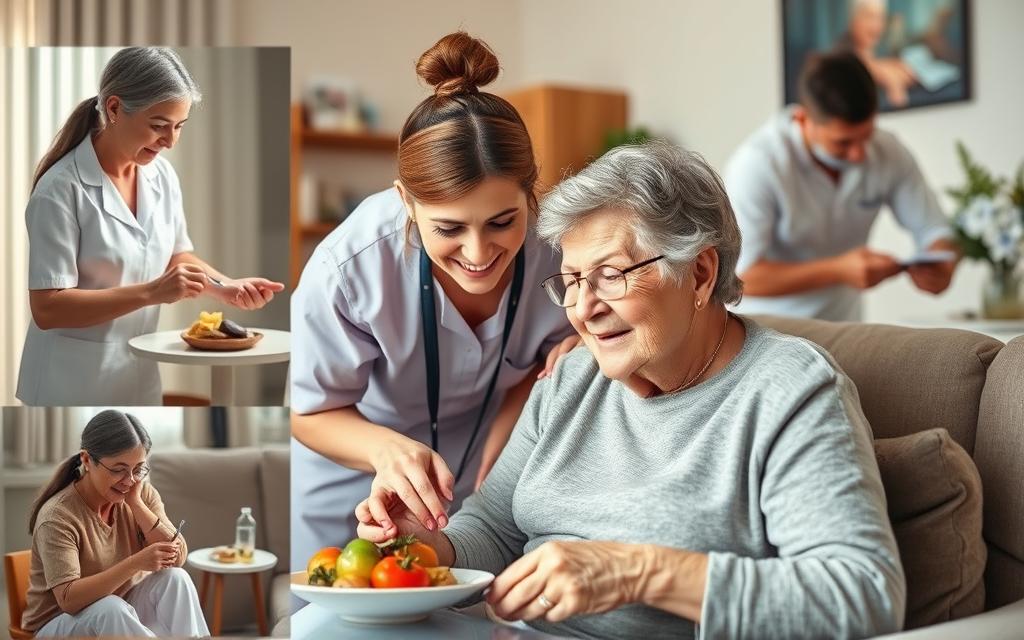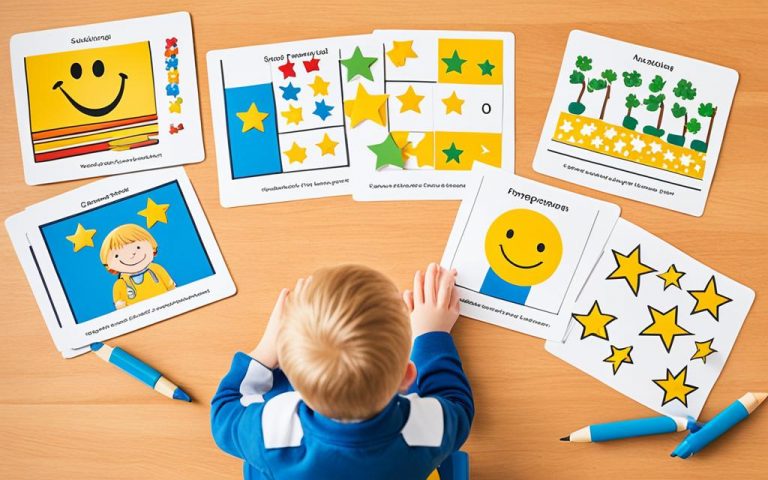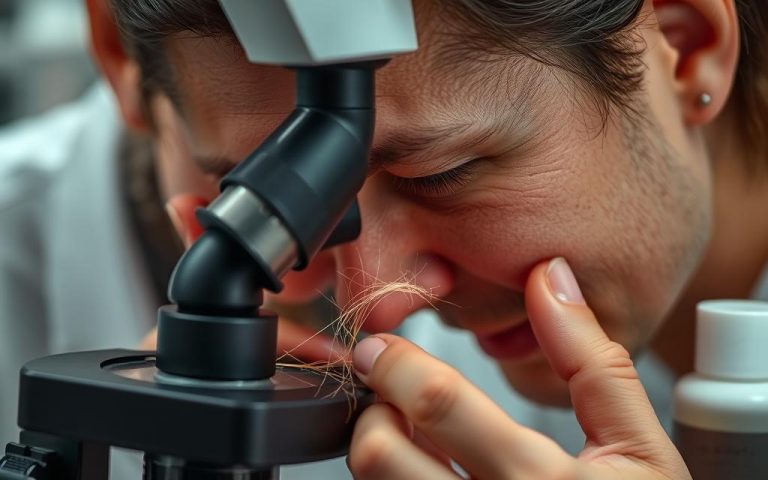Caregiver Job Description: Roles and Responsibilities
Caregiving is a key role in healthcare. As a caregiver, you’ll help people with daily tasks. You’ll do everything from personal care to offering emotional support1.
To be a caregiver, you need certain skills and certifications. You must have a high school diploma or GED. Plus, you need CPR/FA certification and state-mandated certifications2. It’s important to have at least one year of experience helping people with disabilities or mental illnesses2.
Your job will include tasks like giving comfort and personal care. You’ll help with bathing, grooming, and dressing. You’ll also manage medications, cook meals, and drive clients around1. You’ll need to be strong enough to lift up to 50 lbs for moving or repositioning people2.
As a home health aide, you’ll make sure your clients are safe at home. This might mean installing handrails or raised toilet seats1. You must be over 21 and have a valid driver’s license with a clean driving record2.
Key Takeaways
- Caregivers need specific qualifications and certifications
- Personal care and comfort care are primary responsibilities
- Physical strength and stamina are essential
- Creating a safe environment is part of the job
- Experience in supporting individuals with disabilities is required
- Effective communication skills are crucial
Introduction to Caregiving Careers
Caregiving careers are a fulfilling choice for those who love to help others. As a caregiver, you’ll offer crucial support and care to people who need help with everyday tasks. You’ll handle a variety of tasks, from personal care to emotional support3.

You’ll help clients with bathing, feeding, grooming, and managing their medications. You might also assist with exercises, preparing meals, and keeping the house clean. Shopping and going on outings with clients could be part of your job3.
To be great at patient care, you’ll need some qualifications. These include:
- Prior experience (at least 1 year professional or personal)
- Knowledge of emergency procedures like CPR
- Strong housekeeping skills
- Adherence to safety standards
- Physical stamina to lift up to 50 lbs
- Valid driver’s license with a clean record
Important qualities for caregivers are respect, compassion, and great communication skills. Managing your time well is key to handling all your duties. Usually, a high school diploma or similar is needed32.
Starting a caregiving career means committing to making a positive impact on others’ lives. It’s a tough yet rewarding journey that requires both physical and emotional strength. If you’re up for the challenge and want to help through in-home care, a caregiving career could be right for you.
Essential Qualifications for Caregivers
To become a caregiver, you need education, certifications, and practical skills. The caregiving field is expanding, with 3.5 million home health aides and personal care assistants in the U.S. This number is expected to grow in the next decade4.
Educational Requirements
Most caregiving jobs require a high school diploma or GED. Some jobs need more training. For example, home health aides under Medicare must complete at least 75 hours of training and pass a competency test5.
Necessary Certifications
Certifications are key for caregivers. You often need CPR and First Aid certifications. Some states have their own rules for caregivers who give personal care. For example, Washington and New Jersey have set training standards for these roles5.
Experience and Skills
Having experience with people who have disabilities or tough behaviors is valuable. Important skills include clear communication, empathy, and patience. The National Council of Certified Dementia Practitioners says skills go beyond nursing. They focus on being able to meet care needs and understand dementia’s emotional side6.
Being physically strong and able is key for tasks like lifting and keeping clients safe. Skills like time management, problem-solving, and understanding different cultures are also important for caregiving6. When applying for jobs with home care agencies, highlight these skills and any relevant experience in your resume5.
| Caregiver Type | Key Qualifications | Primary Responsibilities |
|---|---|---|
| Nursing Assistant | CNA certification, CPR training | Basic medical care, vital signs monitoring |
| Personal Care Assistant | High school diploma, state-specific training | Assistance with daily living activities |
| Home Health Aide | 75 hours of training (Medicare requirement) | Personal care, basic health-related tasks |
Core Responsibilities of a Caregiver
Caregivers are key in helping those who need help with everyday tasks. Whether you’re caring for the elderly or disabled, your work is vital. You’ll handle food prep, meal planning, personal care, and more7.
Your job includes helping with daily tasks and basic health care7. You’ll assist with bathing, grooming, laundry, and grocery shopping1. You might also help with moving people around, doing light cleaning, and being a friend.
This job can be tough. You’ll need to lift up to 50 lbs safely2. You’ll also manage things like bed sores, incontinence, and brushing teeth1.
- Assist with medication management
- Provide transportation to appointments
- Ensure a clean and safe living environment
- Offer emotional support and engage in activities
Good communication is crucial. You’ll keep detailed records, find support, and talk with healthcare teams and insurance1. This job comes with flexible hours, great training, and rewards for your mental health7.
“Caregiving is not just a job; it’s a calling that requires compassion, patience, and dedication.”
As a caregiver, you’re changing lives. Your work is tough but very rewarding. It brings personal growth and a broader view of the world7.
Personal Care Assistance
Personal care assistance is key for home health aides. They help people who need help with everyday tasks. Tasks include bathing, dressing, grooming, and feeding8.
Bathing and Grooming
Personal care assistants help clients stay clean. They assist with bathing, oral care, and grooming. These actions improve cleanliness and boost the client’s confidence and well-being.
Dressing and Toileting
They help clients get dressed for the day or night. They also assist with toileting, like using bedpans or helping to the bathroom. This job needs patience, respect for privacy, and care for the client’s dignity.
Mobility Support
Mobility support is crucial in patient care. Assistants help move clients from bed to chairs and support them while walking. They ensure safe movement in their homes8. This helps keep the client independent and safe from falls or injuries.
| Task | Description | Importance |
|---|---|---|
| Bathing | Assist with personal hygiene | Promotes cleanliness and health |
| Dressing | Help with appropriate clothing | Maintains dignity and comfort |
| Mobility | Support safe movement | Prevents injuries and maintains independence |
Personal care assistants greatly improve the lives of their clients. They provide non-medical care to seniors at home, focusing on companionship and daily tasks9. While caregivers offer broader support, personal care assistants have more formal training and certifications9. Their specialized knowledge lets them give thorough and caring support to those in need.
Medication Management
Managing medications is a key part of a caregiver’s job. As a nursing assistant, you help make sure patients get their medicines safely and on time. This job needs careful attention and knowing a lot about how to handle medications.
Your job includes giving out medicines as the doctor says and following state laws. You must keep track of each medicine given and watch for any changes in the patient’s health because of the medicine10.
- Follow the exact dosage and timing as ordered
- Keep up with the medicine schedule
- Make sure patients take their medicines as told
- Tell healthcare providers about any bad reactions or worries
Medication management is what sets caregivers apart from medication aides. While both jobs are in demand, aides get special training and make more money. Caregivers earn about $24,000 a year, while aides make around $32,00011.
Good medication management can really make a big difference in someone’s life. By being careful and organized, you help patients get better health care. This also gives peace of mind to patients and their families12.
| Caregiver Responsibilities | Medication Aide Responsibilities |
|---|---|
| Assist with daily activities | Administer medications |
| Provide emotional support | Manage medication schedules |
| Help with personal care | Monitor for side effects |
| Prepare meals | Keep detailed medication records |
Meal Planning and Preparation
Meal planning and preparation are key duties for caregivers in home health aide services. They make sure seniors get the right nutrition and stay hydrated while getting care at home.
Dietary Considerations
When planning meals, caregivers must think about the special dietary needs of seniors. About 69% of seniors have health issues that limit their diet13. Home health aides often manage 3-5 dietary restrictions when planning meals13. They talk with doctors regularly, as 87% of caregivers do, to make sure meals meet dietary needs13.
Food Shopping
Grocery shopping is a big part of in-home care. 78% of caregivers help with this, making it easier for families13. They take stock, make shopping lists, and buy groceries that fit the diet needs. This keeps the kitchen stocked and ensures meals are nutritious.
Cooking and Serving Meals
Preparing and serving meals is a daily job for caregivers. They stick to pre-planned menus, cook, and serve food to those they care for. Caregivers spend about 4 hours a day on meal planning and cooking13. They also suggest 5 healthy snack options daily to encourage good eating habits13.
“Proper nutrition is key to maintaining health and independence for seniors. Caregivers play a vital role in ensuring this through thoughtful meal planning and preparation.”
Caregivers help with meal planning and cooking, which reduces family stress by 45%13. It’s more than just about food; it’s about improving life quality. Seniors who help with meal planning get a 32% boost in mental sharpness13. For more info on in-home care services, call 773-274-926214.
| Meal Planning Task | Percentage of Caregivers Involved |
|---|---|
| Communicating with physicians for dietary instructions | 87% |
| Offering grocery shopping services | 78% |
| Handling 3-5 dietary restrictions | 100% |
Caregiver Job Description: Roles and Responsibilities
A caregiver job description includes many duties. As a personal care assistant, you help people with daily tasks. You assist with personal hygiene, prepare meals, and manage medications.
To become a caregiver, you need at least a high school diploma15. Having a driver’s license is also a plus, as you might need to take clients to appointments or do errands15. Caregivers in the U.S. usually earn between $20,000 and $35,000 a year, depending on where they work and their experience16.
Your job is more than just physical care. You also offer emotional support, do fun activities, and keep the living area safe. It’s important to talk well with healthcare workers and keep accurate records of care.
| Key Responsibilities | Required Skills |
|---|---|
| Personal hygiene assistance | Patience and empathy |
| Medication management | Attention to detail |
| Meal preparation | Basic cooking skills |
| Emotional support | Strong communication |
| Home safety maintenance | Problem-solving abilities |
The need for caregivers is increasing fast. The Bureau of Labor Statistics expects a 36% growth in jobs for home health and personal care aides from 2018 to 202817. This shows we need more skilled caregivers as our society ages.
Home Safety and Maintenance
As a home health aide, making sure the living space is safe is key. Your job goes beyond just personal care. It’s about making a secure place for your clients. This means spotting and fixing any dangers at home.
Your job includes setting up safety tools like handrails and non-skid mats to stop accidents. You also need to keep the home clean and do some light cleaning. Plus, check that safety gear like smoke alarms and fire extinguishers work right.
Sometimes, you might need to change the home to fit special equipment. This could mean making room for hospital beds or putting in lifts for moving around easier. Paying attention to these things can really make your client’s life better and safer.
It’s worth noting that 76% of senior caregivers feel they’re not fully ready for all their caregiving tasks18. This shows how important it is to get good training and keep learning about home safety and upkeep for caregivers.
- Regularly check the home for dangers
- Make sure all areas are well-lit
- Clear walkways of clutter
- Check and keep safety gear in good shape
Your job as a home health aide is crucial in giving your clients a safe and cozy place. By focusing on safety and upkeep, you’re not just doing your job. You’re also giving your clients and their families peace of mind.
Emotional Support and Companionship
Emotional support and companionship are key parts of being a caregiver for the elderly. You help improve their life quality and well-being. Your support gives them comfort, security, and a sense of belonging19.
Communication Skills
Good communication is essential in caring for patients. As a caregiver, you must listen well, be empathetic, and respond right to your client’s needs. This builds trust and creates a positive bond.
Providing Comfort and Encouragement
Your role goes beyond just physical care. You offer emotional support by being there to listen and show empathy19. This greatly affects the mental health and well-being of those you care for.
Engaging in Activities
As part of your duties, you help clients do things that are fun and meaningful. This encourages social interaction and keeps their minds active19. Activities can include:
- Reading together
- Playing games
- Going for walks
- Participating in hobbies
These activities fight off loneliness and boost the patient’s overall well-being19.
| Caregiver Role | Impact on Patient |
|---|---|
| Emotional Support | Enhanced security and well-being |
| Companionship | Reduced loneliness, improved social interaction |
| Engaging Activities | Cognitive stimulation, improved quality of life |
By offering emotional support and companionship, you make a big difference. You help those you care for stay independent and improve their overall well-being19.
Health Monitoring and Reporting
As a caregiver, your job goes beyond just daily care tasks. You must keep an eye on your client’s health and report any changes. This includes watching their physical and emotional health.
Your job as a nursing assistant means keeping accurate records. You should note down care given, medicines taken, and activities done. These records help talk to healthcare workers and make changes to care plans if needed20.
To be good at health monitoring, remember these important points:
- Watch and record any changes in physical health
- Keep an eye on how they feel emotionally and act
- Document all medicines and treatments given
- Talk well with supervisors and healthcare teams
As a caregiver, you often spot small health changes first. Your quick action can help catch problems early and improve health outcomes21.
| Monitoring Area | What to Observe | Reporting Frequency |
|---|---|---|
| Physical Health | Pain levels, changes in how they move, eating habits | Daily |
| Emotional Well-being | Changes in mood, feeling anxious or depressed | Weekly |
| Medication Effects | Any side effects, if the medicine is working | As needed |
| Activities of Daily Living | How independent they are, any challenges they face | Monthly |
By carefully watching and reporting on these things, you play a key role in patient care. Your sharp eye and accurate reports greatly help improve patient care22.
Transportation and Appointment Assistance
As a home health aide, your job goes beyond just staying at home. You often help with transportation and making sure clients get to their appointments. This helps clients stay independent and get the medical care they need.
You’ll drive clients to their appointments and outings. Having a valid driver’s license and a clean driving record is a must. About 75% of caregivers help with this kind of transportation as part of their job23.
Setting up appointments is also part of your job. You’ll manage your client’s schedule, get documents ready, and go with them to doctor’s visits. Being good at managing time is key, as 95% of caregivers make sure clients get to appointments on time24.
Beyond Medical Appointments
Your job isn’t just about taking clients to the doctor. Many caregivers also help with shopping and other outings. In fact, 80% of caregivers assist with meal-related tasks, like grocery shopping2324.
| Caregiver Transportation Tasks | Percentage of Caregivers Involved |
|---|---|
| Medical Appointments | 75% |
| Shopping Trips | 80% |
| Social Engagements | 60% |
Your role in helping with transportation and appointments is very important. It greatly improves your clients’ well-being and life quality. By being good at these tasks, you become a key part of your clients’ support team.
Legal and Ethical Considerations in Caregiving
Caregiving comes with big legal and ethical duties. Caregivers must give seniors under their care enough food, shelter, health care, and protection from harm25. This goes beyond just doing what’s right, it’s about showing respect to the elderly and their families25.
It’s key for caregivers to know the law. Not taking care of seniors can lead to legal trouble, showing how important it is to follow the right care standards25. Judges look closely at evidence of neglect or abuse, so caregivers should keep detailed records25.
Being ethical means respecting clients’ privacy and keeping their secrets, and sticking to professional limits. Caregivers should look out for their clients’ needs while also following the law.
“Valuing the Invaluable: A New Look at the Economic Value of Family Caregiving” shows how much family caregivers do, highlighting the need for support26.
Good communication is key in ethical caregiving. A study by the Alzheimer’s Association points out the gap between doctors and caregivers, showing the need for better communication26.
| Legal Considerations | Ethical Considerations |
|---|---|
| Providing adequate care | Respecting client privacy |
| Preventing neglect and abuse | Maintaining confidentiality |
| Proper documentation | Upholding professional boundaries |
| Reporting elder abuse | Advocating for client’s best interests |
Following these legal and ethical rules helps caregivers give the best care. It also keeps them and their clients safe from legal problems.
Conclusion
The job of a caregiver is very important in healthcare. They help people who can’t take care of themselves because of age, sickness, or disability27. Caregivers do many things like personal care, help with daily tasks, and offer emotional support27.
To be a caregiver, you need certain skills and traits. You usually need a high school diploma, but some jobs want more education in healthcare. You should have at least 3 years of experience in caregiving28. Important skills include knowing how to act in emergencies, giving first aid, cleaning, and cooking special diets. You also need to be strong for lifting and moving clients28.
There is a big need for caregivers. About 40 million Americans care for older family members or friends28. As a home health aide, your kindness, emotional strength, and ability to handle stress are key28. By doing your job well, you make a big difference in the lives of those you care for27.
FAQ
What are the main responsibilities of a caregiver?
Caregivers help with personal care like bathing and dressing. They follow health plans and organize homes. They also provide emotional support and help with moving around.
They watch for health or behavior changes and take clients to appointments. Keeping the home safe and clean is also part of their job.
What qualifications are necessary to become a caregiver?
You need a high school diploma or GED for caregiving. You should have CPR and First Aid certifications. State-mandated qualifications are also required.
Having experience with people who need extra help is good. Skills like health promotion and creating safe spaces are important. You must also be able to lift and move patients safely.
What does personal care assistance involve?
Personal care includes bathing and dressing. Caregivers use safe techniques to move patients. They help with oral hygiene and managing incontinence.
They also support mobility by helping with getting in and out of bed. This ensures safe movement in the home.
How do caregivers manage medications?
Managing medications is key for caregivers. They give out medications as ordered by doctors and follow state laws. They know how to document medication and report any issues related to it.
What are the responsibilities of caregivers regarding meal planning and preparation?
Caregivers plan and prepare meals, considering special diets. They shop for groceries and serve meals. They encourage good nutrition and watch for changes in eating habits.
How do caregivers ensure home safety?
Caregivers make homes safe by fixing hazards. They install safety items and keep homes clean. They check that safety devices like smoke alarms work.
They also adjust the home for special equipment like hospital beds.
What role do caregivers play in providing emotional support and companionship?
Caregivers offer emotional support and companionship. They use good communication to comfort and encourage clients. They help with leisure activities and keep clients mentally healthy.
They need to be patient and empathetic, building trust with clients while respecting their privacy.
How do caregivers monitor and report on the health of their clients?
Caregivers watch the health and feelings of their clients. They note any changes in health or behavior. They keep accurate records of care and talk to supervisors and doctors as needed.
Do caregivers provide transportation and appointment assistance?
Yes, caregivers drive clients to appointments and help with errands. They need a valid driver’s license and a clean driving record. They help with scheduling and going to doctor’s visits.
What legal and ethical considerations do caregivers need to be aware of?
Caregivers must follow the law and ethical standards. This means keeping client information private and following all laws. They need to know about reporting elder abuse and respecting professional boundaries.
They should know about client rights and speak up for what’s best for them.
Source Links
- https://www.caringinfo.org/planning/caregiving/caregiver-duties-and-activities/ – Caregiver Activities, Duties and Responsibilities – CaringInfo
- https://hiring.monster.com/resources/job-descriptions/service/caregiver/ – Caregiver Job Description Template
- https://www.talentlyft.com/en/resources/caregiver-job-description – Caregiver job description template
- https://www.senior1care.com/caregiver/caregiver-qualifications-requirements/ – What Qualifications Do I Need to Become a Caregiver? – Senior1Care of South Bend
- https://www.caregivers.com/in-home-care/caregiver-qualifications – Caregiver Qualifications
- https://www.nccdp.org/8-essential-caregiver-skills-you-need-to-succeed/ – 8 Essential Caregiver Skills You Need To Succeed – NCCDP
- https://myallamericancare.com/caregiver/caregiver-duties/ – Understanding Caregiver Duties in Today’s World
- https://resources.workable.com/personal-care-assistant-job-description – Personal Care Assistant job description
- https://seniorhomecompanions.com/what-is-the-difference-between-a-caregiver-and-pca/ – What Is The Difference Between A Caregiver And PCA?
- https://myallamericancare.com/caregiver/caregiver-job-description/ – Finding the Perfect Caregiver Job Description
- https://dreambound.com/blog/caregiver-vs-medication-aide – Caregiver vs Medication Aide | Dreambound
- https://www.renaissancehomehc.com/post/essential-caregiver-job-responsibilities-exposed – Essential Caregiver Responsibilities Exposed – Renaissance Home Care
- https://www.24hrcares.com/resource-center/caregiver-can-help-meal-planning – How a Caregiver Can Help in Meal Planning – 24 Hour Home Care
- https://homecare-aid.com/meal-preparation-groceries-nutrition-assistance/ – Meal Preparation Services Provided by Caregivers for Seniors | Elder Care
- https://www.betterteam.com/caregiver-job-description – Caregiver Job Description
- https://123consultingsolutions.com/caregiver-job-description – Caregiver Job Description: Template, Top Duties and Qualifications
- https://www.carelink.org/what-are-the-duties-and-responsibilities-of-a-caregiver/ – What Are the Duties and Responsibilities of a Caregiver?
- https://www.aplaceformom.com/caregiver-resources/articles/caregiver-duties – Top 10 Senior Caregiver Duties
- https://www.h2hhc.com/blog/three-major-jobs-of-caregiver – What Are The 3 Major Jobs of a Caregiver?
- https://www.h2hhc.com/blog/caregiver-responsibilities – Caregiver Duties and Responsibilities
- https://www.care.com/c/senior-caregiver-duties-definition/ – Top 11 caregiver duties to know
- https://axiscare.com/blog/how-to-write-a-caregiver-job-description/ – How to Write a Caregiver Job Description
- https://cedarsinaipark.org/wp-content/uploads/2018/08/caregiver-job-description.pdf – PDF
- https://resources.workable.com/caregiver-job-description – Caregiver job description
- https://lanzonemorgan.com/navigating-legal-responsibilities-of-caregivers-and-litigation/ – Legal Responsibilities of Caregivers: Understanding Elder Care Law
- https://www.ncbi.nlm.nih.gov/pmc/articles/PMC2839338/ – Family Caregivers, Patients and Physicians: Ethical Guidance to Optimize Relationships
- https://www.nautilusshc.com/blog/caregiver-job-description – Caregiver Job Description
- https://www.thehumancapitalhub.com/articles/caregiver-job-description – Caregiver Job Description






